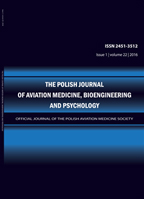2022, Volume 28, Issue 3
EFFECT OF COVID-19 ON THE NUTRITIONAL STATUS OF POLISH MILITARY FLYING PERSONNEL AND VITAMIN D SUPPLEMENTATION ON THE INCIDENCE OF DISEASE – A RETROSPECTIVE COHORT STUDY
AGATA GAŹDZIŃSKA1, MAGDALENA KRZYŻANOWSKA1, PAWEŁ JAGIELSKI2
-------------------------------------------------------------------------------------------------
1Department of Psychophysiological Measurements and Human Factor Research, Military Institute of Aviation Medicine
2Department of Nutrition and Drug Research, Faculty of Health Science, Jagiellonian University, Medical College
Autor korenspondencyjny: AGATA GAŹDZIŃSKA; Department of Psychophysiological Measurements and Human Factor Research, Military Institute of Aviation Medicine; email: afrotena@gmail.com
Full text
Streszczenie
Introduction: On 4 March 2020, the first case of coronavirus was detected in Poland, and on 20 March 2020, the Minister of Health declared a state of epidemic in the country, which entailed numerous changes in public life. The aim of this study was to assess the comparative nutritional status of Polish military flying personnel before and after two years of the COVID-19 pandemic and to examine the effect of vitamin D supplementation on the incidence of COVID-19.
Methods: Measurements were obtained from all members of active military flight personnel in Poland who reported for mandatory annual anthropometric examinations at the Military Institute of Aviation Medicine in Warsaw. Nutritional status was assessed through anthropometric examinations and body composition analysis using the bioimpedance method. Overweight and obesity were assessed by Body Mass Index (with overweight defined as a BMI of 25-29.9 kg/m2 and obesity as a BMI ≥ 30 kg/m2) and body fat content, according to WHO criteria. Nutritional status surveys were conducted twice: in 2019 and in 2021. Subjects were asked about prior COVID-19 infection and vitamin D supplementation in the autumn-winter period, including the dosage and frequency of supplementation, if applicable.
Results: Analysis of the results showed that the pandemic had a significant adverse effect on the increase in such parameters of soldiers' nutritional status as body weight, BMI, and body fat (p < 0.05). In 2019, 54.3% of soldiers were found to be overweight, and 12% obese. There was no significant change in the percentage of overweight subjects during the pandemic period (p > 0.05). 15% of the subjects increased their body weight by more than 5%, while 7% decreased their body weight by more than 5% of their baseline weight. The largest percentage of soldiers (78%) maintained their baseline weight within ±5%. COVID-19 incidence was shown to have no significant effect on the nutritional status of military flying personnel (p > 0.05). Only 44% of the subjects declared that they supplemented with vitamin D during the autumn-winter period. It was shown that vitamin D supplementation had no significant effect on the incidence of COVID-19 in the study group (p < 0.05).
Conclusions: The first two years of COVID-19 pandemic adversely affected the nutritional status of military flying personnel. Therefore, regular self-monitoring of body weight is recommended to enable early therapeutic intervention and prevent excessive weight gain. No association was found between vitamin D supplementation and the incidence of COVID-19. More than half of the military flying personnel surveyed did not take vitamin D supplements at all, and only one-third were aware of the recommendations for supplementation with this vitamin, indicating a need for further education in this area.
Słowa kluczowe
Covid-19, nutritional status, BMI, vitamin D, military flying personnel
